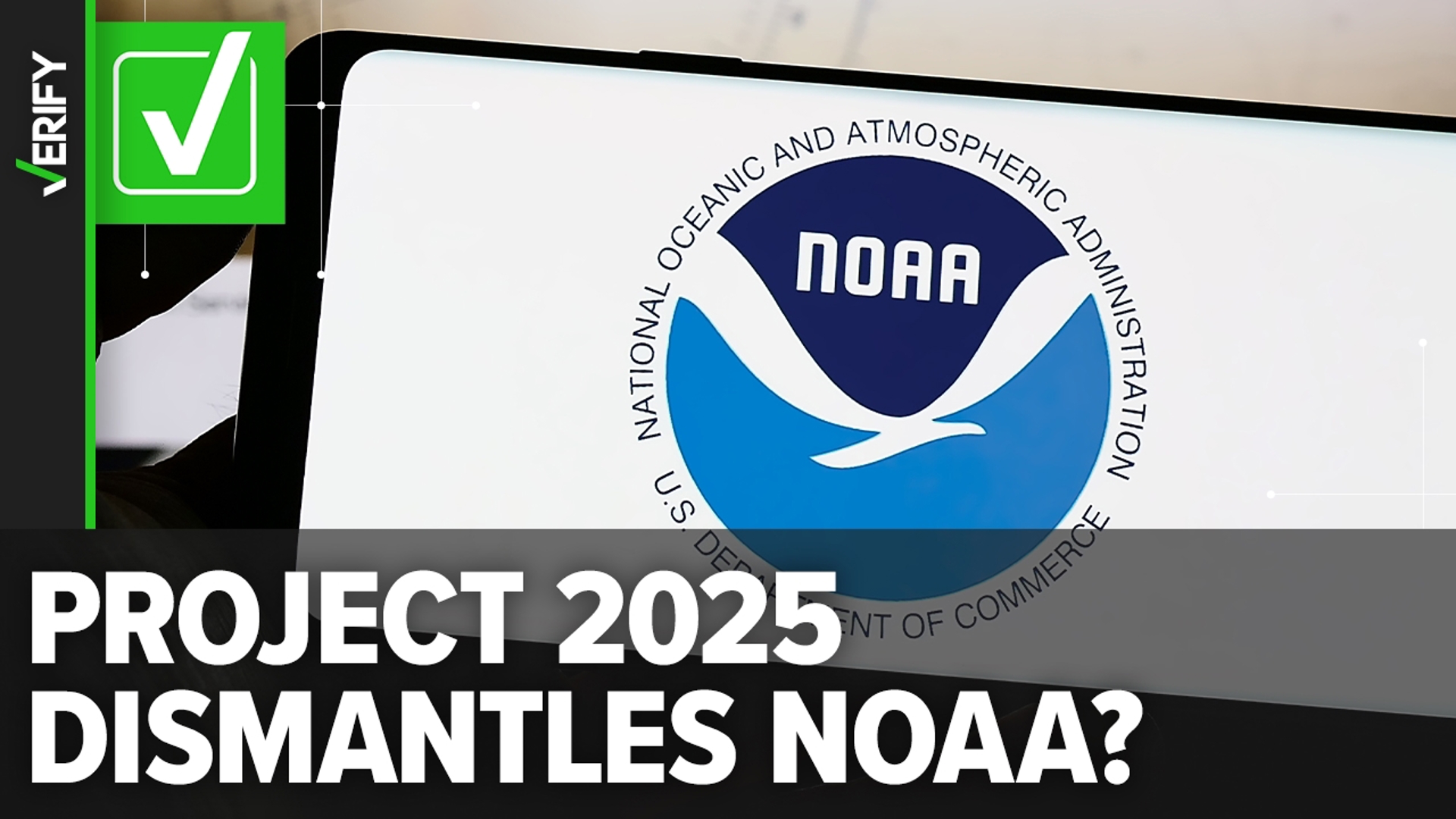VERIFY readers have sent us dozens of questions about Project 2025 ahead of the 2024 presidential election. Project 2025 is an initiative launched by conservative think tank The Heritage Foundation to transform the federal government during the next conservative administration.
Multiple social media posts claim Project 2025 plans to dismantle the National Oceanic and Atmospheric Administration (NOAA). NOAA is a federal agency that provides daily weather forecasts, severe storm warnings, climate predictions and projections, as well as nautical charts and navigational information.
“Project 2025 has in its 900 pages a plan to get rid of the NOAA. The NOAA provides your weather predictions, the prediction and tracking of hurricanes, marine commerce support, other severe storm warnings, climate monitoring, and more. Unreal,” says a Facebook post with over 35,000 shares.
VERIFY reader Lois asked our team in an email whether these claims are true.
THE QUESTION
Does Project 2025 recommend dismantling the National Oceanic and Atmospheric Administration?
THE SOURCES
- “Mandate for Leadership: The Conservative Promise,” published by The Heritage Foundation, the conservative think tank behind Project 2025
- National Oceanographic and Atmospheric Administration
- AccuWeather
- Council on Foreign Relations
- Alice C. Hill, J.D., David M. Rubenstein senior fellow for energy and the environment at the Council on Foreign Relations
THE ANSWER
Yes, Project 2025 recommends dismantling the National Oceanic and Atmospheric Administration and its offices, including the National Weather Service.
WHAT WE FOUND
The Heritage Foundation’s “Mandate for Leadership: The Conservative Promise,” the 922-page document commonly known as Project 2025, proposes the National Oceanographic and Atmospheric Administration (NOAA) and its main offices “be dismantled and many of its functions eliminated, sent to other agencies, privatized, or placed under the control of states and territories.”
“Together, these form a colossal operation that has become one of the main drivers of the climate change alarm industry and, as such, is harmful to future U.S. prosperity,” wrote Thomas F. Gilman, the author of Project 2025’s Department of Commerce chapter.
NOAA, an agency within the U.S. Department of Commerce, was established in 1970 when the U.S. Coast and Geodetic Survey, the Weather Bureau and the U.S. Commission of Fish and Fisheries were brought together. NOAA consists of six main offices:
Gilman is a former Chrysler executive who served as the U.S. Department of Commerce’s chief financial officer and assistant secretary for administration during the Trump administration. He writes in Project 2025 that the next conservative president should break up the NOAA and its six main offices.
“This industry’s mission emphasis on prediction and management seems designed around the fatal conceit of planning for the unplannable,” Gilman wrote. “That is not to say NOAA is useless, but its current organization corrupts its useful functions. It should be broken up and downsized.”
Gilman also recommends reviewing the work of the National Hurricane Center and the National Environmental Satellite Service.
“The National Hurricane Center and National Environmental Satellite Service data centers provide important public safety and business functions as well as academic functions, and are used by forecasting agencies and scientists internationally. Data continuity is an important issue in climate science. Data collected by the department should be presented neutrally, without adjustments intended to support any one side in the climate debate,” Gilman wrote.
On the NOAA website, the agency says its mission is to study and predict changes in climate, weather, ocean and coasts; to share that knowledge and information with others; and to conserve and manage coastal and marine ecosystems and resources.
In June, for example, researchers at the NOAA’s National Centers for Environmental Information found that June 2024 was Earth’s warmest June on record and the globe’s 13th-consecutive month of record warmth. The agency also found that it was the second-warmest June in the United States following a series of record-setting heat waves.
In 2019, the Trump administration attempted to cut funding for NOAA research because it clashed with the former president’s public skepticism about climate change, according to the Council on Foreign Relations. But Congress rejected the proposed 13% budget cut.
In that same year, former President Donald Trump was accused of politicizing NOAA’s forecasting following a Twitter spat over Hurricane Dorian’s expected path. The Trump administration also attempted to recruit researchers who were skeptical about climate change to work at NOAA, the Council on Foreign Relations says.
Alice C. Hill, J.D., the senior fellow for energy and the environment at the Council on Foreign Relations, said in 2021 that “NOAA’s research is critical for giving local decision-makers better tools to respond to climate change.”
In Project 2025, Gilman also suggested that the National Weather Service should focus on commercial operations and utilize creating partnerships with private companies, like AccuWeather, to “ensure that taxpayer dollars are invested in the most-cost-efficient technologies for high quality research and weather data.”
“The NWS provides data the private companies use and should focus on its data-gathering services. Because private companies rely on these data, the NWS should fully commercialize its forecasting operations,” Gilman wrote.
The National Weather Service provides weather, water, and climate forecasts and warnings for the U.S., its territories, adjacent waters and ocean areas, “for the protection of life and property and the enhancement of the national economy.”
“The ultimate goal is to have a society that is prepared for and responds to weather, water and climate events,” the National Weather Service says on its website.
On July 10, AccuWeather issued a press release that said the company does not support Project 2025’s plans to fully commercialize NWS operations or dismantle NOAA.
“AccuWeather does not agree with the view, and AccuWeather has not suggested that the National Weather Service (NWS) should fully commercialize its operations. The authors of ‘Project 2025’ used us as an example of forecasts and warnings provided by private sector companies without the knowledge or permission of AccuWeather,” AccuWeather CEO Steven R. Smith said in a statement.
AccuWeather says in the press release that it already partners with NOAA and dozens of other government agencies across the globe “to share life-saving weather alerts with the public across our free AccuWeather digital properties.”
“The American public and economy are best served when all entities provide their expertise, capabilities, and contributions to the common goal of best informing the public and protecting lives and property through accurate and timely forecasts and warnings,” AccuWeather said.
Gilman’s other NOAA recommendations in Project 2025 include transferring National Ocean Service survey functions to the U.S. Coast Guard and the U.S. Geological Survey, streamlining the National Marine Fisheries Service and the U.S. Fish and Wildlife Service, and downsizing the Office of Oceanic and Atmospheric Research.












